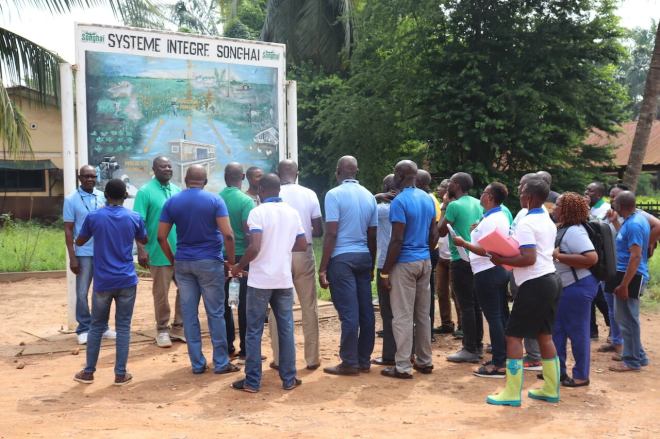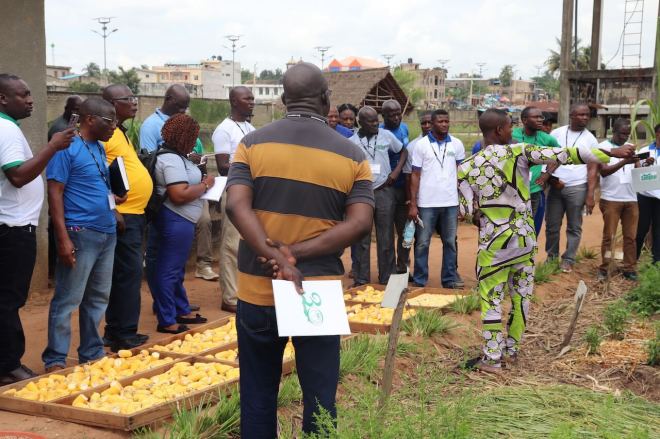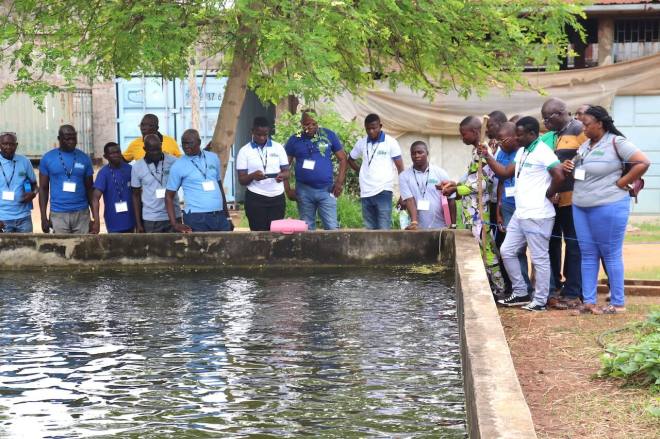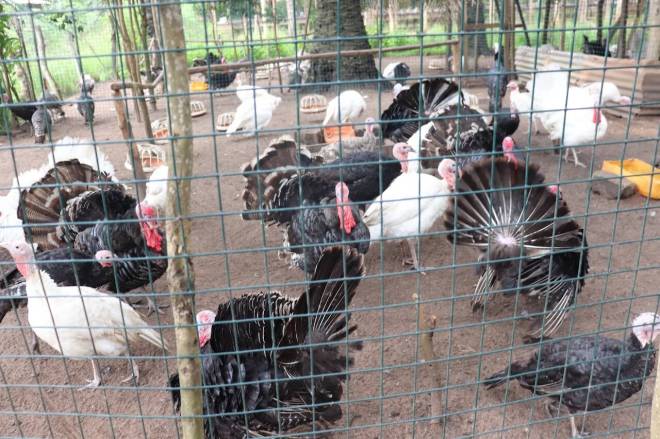
Trainees are taken through different varieties of corn and are taught several methods of corn farming. PHOTO: PHILEAS JUSU
By Phileas Jusu
October 20, 2022 | PORTO NOVO, BENIN
Twenty-seven farm and technical operatives of the Bishop John K. Yambasu Agricultural Initiative (YAI) from Sierra Leone, Liberia, Nigeria and Zimbabwe are learning agricultural entrepreneurship skills at a two-week training at Songhai Center – a research, teaching and production center in sustainable farming in Port Novo, Benin.

Songhai Center trains and supports staff of agribusiness organizations and individuals yearning to take agriculture from subsistence to entrepreneurship.
Welcoming participants on Monday, Oct. 10, Songhai Center founder and director, Father Godfrey Nzamujo, provided an overview of the center’s success, noting that the project is the fruit of a long walk, reflection and searching to identify the source of the difficulty of food security in Africa.
Like Songhai, he said, a program such as the YAI needs individuals who have a different vision of the world, people who are equipped differently. “You are coming here to develop this new way of looking at yourself and looking at the world so that you develop that new vision,” he said. Nzamujo encouraged participants to develop ways of doing things to sharpen their skills and see their Christian roles as transformers of the world. “You cannot do it by talking. This new ministry is at the core of our humanity – food, entrepreneurship. You are combining your spiritual and religious calling with your entrepreneurial calling, practicalizing things as you do evangelism,” he said.

Dr. Kepifri Lakoh, director of the Yambasu Agriculture Initiative for Global Ministries, said the initiative offers a new way for Africans to solve a critical problem within the continent and within the UMC annual conferences. Noting that more than 62% of the funds used in annual conferences in Africa comes from the West, he asked, “Are we going to continue that same level of dependence? Our leaders on the continent of Africa have asked if we can challenge ourselves to be responsible for our own destinies; to harness the resources that we have within the continent; and decrease this level of dependence on foreign aid to support our mission.”
Lakoh emphasized the YAI’s main objectives: creating revenue streams through agriculture; support at the community and church level as the initiative increases income; and reinvestment to create sustainability. Another tenet, he said, was ownership; conferences must own the initiative and contribute to the growth of its process.

In 2021, the YAI invested in animal husbandry and cultivated about 150 acres for rice farming in Sierra Leone. It invested in a piggery project which now has nearly 60 pigs. After three days of hands-on learning in piggery, the Rev. Solomon Rogers, the initiative’s program coordinator, was excited at the volume of knowledge he acquired. “One thing stands out for me: the introduction of medicinal herbs like chew and moringa leaves into the feed of the pigs for healthy living. Those herbs are in Sierra Leone as well. I hope to introduce that upon my return,” he said. Rogers is already sketching the dimensions of his next piggery project in the Yonibana District. He has learned to construct the correct height, width and length of troughs within the piggery and how to let in sunlight for the healthy growth of animals.
After just two days of learning at Songhai Center, Liberia-based Ezekiel Freeman thinks differently about poultry and pigs too. He now knows that cross breeding of animals must go along with the age of the animals for healthy breeding.
Nigeria and Zimbabwe are in the budding stages of the project. Kalavo Thomas Kwalla, the monitoring and evaluation officer for the conference’s program, thinks the training could not be timelier, since Nigeria hopes to go into poultry and rearing of small ruminants. He visited the free range poultry production unit to learn about the hatching and selection of eggs and the production of chicken feed. Fellow Nigerian, Ephraim Ibrahim Jen, also noted all that he had learned in just two days. “I initially did not know anything about raising broiler chickens…I also learned about free range with turkey, guinea fowl and others. We normally don’t value waste products in our country. We have now realised that they are very important – waste can be converted to wealth,” he said.

Rev. Launcelot Makundu from Zimbabwe said that in the new season, they will be investing in the production of maize and soya beans. “In just two days, I’ve rediscovered myself in terms of crop production and poultry production,” he said. Zimbabwe will also be investing in poultry production, using new knowledge about the construction and specifications of the chicken houses, sanitation, hygiene and incubation.
A previous training for the YAI Francophone (French-speaking) countries ended in early October. A training for Lusophone (Portuguese-speaking) countries is set to follow by the end of October.
Phileas Jusu is the director of communications for the Sierra Leone Annual Conference.

